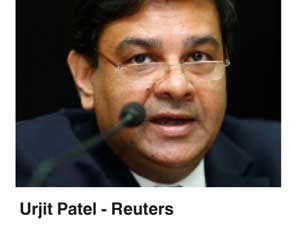Monday Feb 23, 2026
Monday Feb 23, 2026
Monday, 22 August 2016 00:01 - - {{hitsCtrl.values.hits}}
 NEW DELHI/MUMBAI (Reuters): India’s government promoted Urjit Patel, a deputy governor in charge of monetary policy at the Reserve Bank of India, to serve as its next governor for a three-year term, it said on Saturday.
NEW DELHI/MUMBAI (Reuters): India’s government promoted Urjit Patel, a deputy governor in charge of monetary policy at the Reserve Bank of India, to serve as its next governor for a three-year term, it said on Saturday.
He will replace Raghuram Rajan, a former International Monetary Fund chief economist who stunned financial markets in June by announcing he would step down in September and return to academia after a single three-year term at the RBI.
Patel, 52, headed a panel that recommended landmark changes to monetary policy in India, including a switch to inflation-targeting and the creation of a panel to set interest rates. He will start his three-year term on 4 September.
“The Appointments Committee of Cabinet has approved the appointment of Dr. Urjit R. Patel as Governor, Reserve Bank of India for a period of three years,” said the statement from the government.
Patel, who has a doctorate from Yale, had widely been seen as ensuring the most continuity among the candidates believed to be in the running to be the next governor.
He had been reappointed in January for another three years as deputy governor in charge of monetary policy, a department he has run since 2013.
Seen as a close lieutenant to Rajan, Patel will now get to implement the policies he had helped shape.
The government is soon expected to announce the composition of a six-member monetary policy committee to decide on interest rates. It will be made up of himself and two other RBI officials, along with three members appointed by the government.
Rajan, who succeeded in halving the inflation rate from the double digit levels prevailing when he took over, also persuaded the government to adopt inflation targeting, setting a medium term central target of 4% , within a range of 2 to 6% - another policy endorsed by Patel.
The new governor takes over at a time when inflation has bust out of the top end of that range. Consumer inflation accelerated to 6.07% in July, the fourth consecutive month it has stayed above the RBI’s near-term target of 5% by March.
Aside from controlling inflation, the new governor will have to follow through on efforts to clean-up banks’ bad loans so that they can once again support the investments needed if India is to keep its place as one of the world’s fastest growing economies.
Patel will also have to navigate India’s tricky political scene. Right-wing members of the ruling Bharatiya Janata Party (BJP) had criticised Rajan for some of his speeches on economic matters and for not cutting interest rates faster.